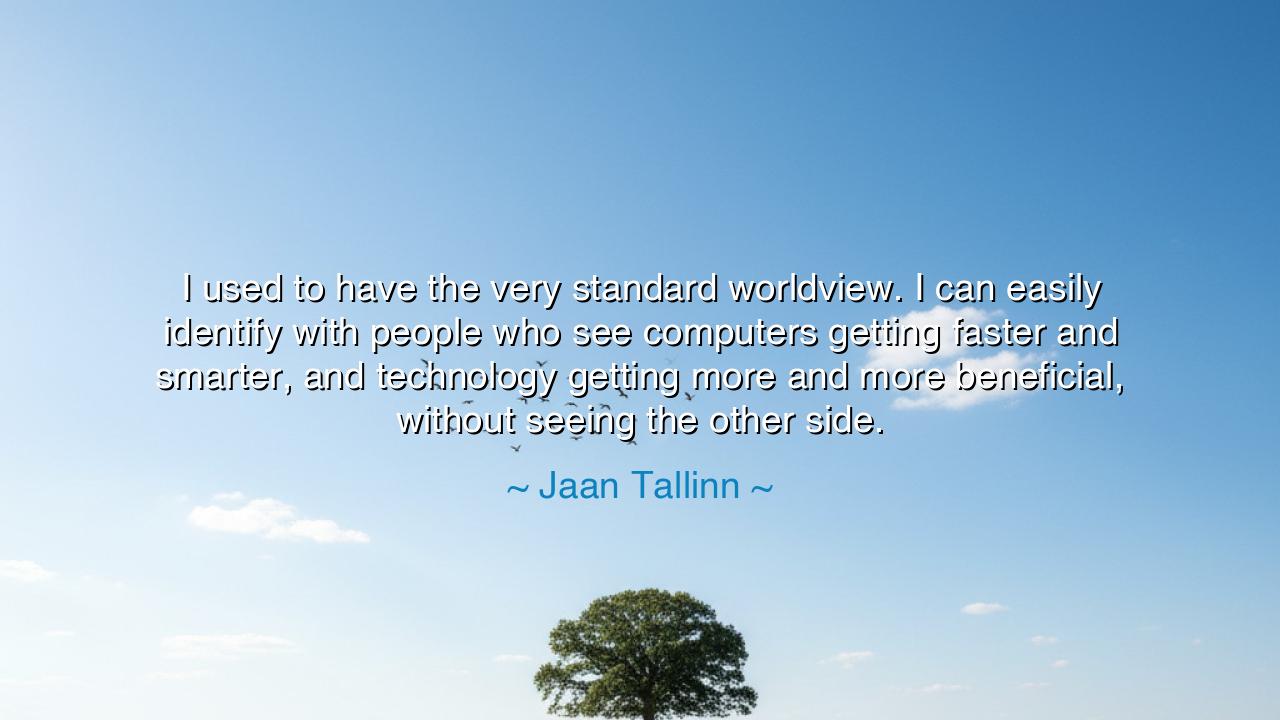
I used to have the very standard worldview. I can easily identify
I used to have the very standard worldview. I can easily identify with people who see computers getting faster and smarter, and technology getting more and more beneficial, without seeing the other side.






In the reflective words of Jaan Tallinn, co-founder of Skype and philosopher of the digital age, there lies a confession that speaks to both the brilliance and blindness of our time: “I used to have the very standard worldview. I can easily identify with people who see computers getting faster and smarter, and technology getting more and more beneficial, without seeing the other side.” These words are not spoken in arrogance, but in humility — the humility of one who has peered beyond the veil of progress and seen that every light casts a shadow. Tallinn’s message is not merely about machines or innovation; it is about awakening, about learning to see the world not as a tale of endless triumph, but as a fragile balance between creation and consequence.
In his youth, Tallinn was like many in the modern world: enchanted by the rhythm of technological growth. He watched as computers grew faster, as artificial intelligence became more capable, as human life was transformed by the digital tools once dreamed of only in myths. It was easy, then, to believe in the promise of technology — that each new invention would lift humanity higher, banish hardship, and bring an age of peace and plenty. This was the standard worldview, the faith of an age intoxicated with progress. And yet, like many who climb too high, he began to see what lay beyond the bright horizon — the darker side of the same brilliance.
For as machines grew smarter, they also grew unpredictable; as networks connected hearts across oceans, they also spread division and deceit. The very tools that promised freedom began to shape dependence; the systems that amplified human thought began to outpace it. In this realization, Tallinn joined the lineage of those who, throughout history, have looked upon human achievement and asked the harder question: “What price do we pay for power?” Just as Prometheus stole fire for mankind — a gift that could warm or destroy — so too have we drawn the flame of intelligence into circuits and code, without yet knowing whether it will save or consume us.
The story of Robert Oppenheimer, father of the atomic bomb, stands as a mirror to Tallinn’s awakening. Oppenheimer, too, was once filled with the awe of discovery. He saw the splitting of the atom as the triumph of intellect — proof that humanity could master the deepest laws of nature. Yet, when his creation burned across the skies of Hiroshima, he uttered the words of the Bhagavad Gita: “Now I am become Death, the destroyer of worlds.” In that moment, brilliance turned to burden, and knowledge to sorrow. So it is with the technologies of our own age: we celebrate the marvels of artificial intelligence and genetic engineering, but seldom pause to measure the weight of their power.
When Tallinn speaks of “the other side,” he is pointing to this very blindness — the human tendency to see progress as a ladder that only ascends, never realizing it can also lead into the abyss. The “other side” is not anti-technology; it is awareness — the understanding that every new tool, no matter how benevolent, reshapes the world in ways both intended and unforeseen. To ignore this is to walk as a giant with eyes closed, trampling both marvel and meaning beneath our feet. The wise do not reject invention, but temper it with foresight; they do not shun power, but bind it with responsibility.
Tallinn’s own journey led him to dedicate his life not to the creation of more machines, but to the protection of humanity from their potential dangers. Through his work with organizations like the Centre for the Study of Existential Risk, he became a sentinel of the future — one who watches not with fear, but with reverence for what must be preserved. His transformation is a lesson for all creators: that the greatest act of wisdom is not in building without limit, but in asking whether what we build serves life or endangers it.
And so, the lesson that emerges from his words is clear: do not mistake advancement for wisdom, nor progress for peace. The tools we create reflect our nature; if we are blind, they will magnify our blindness, but if we are mindful, they will magnify our light. The first step toward true innovation is humility — the recognition that every invention carries both promise and peril. Before we rush to make machines that think, we must remember what it means to be human.
Therefore, children of the digital dawn, heed the wisdom of Jaan Tallinn: marvel at technology, but do not worship it. Let your curiosity burn bright, but let your conscience guide its flame. When you build, build with eyes open; when you design, remember the world you shape. For in seeing both sides — the light and the shadow — humanity may yet become not the victim of its own creations, but their wise and enduring master.






AAdministratorAdministrator
Welcome, honored guests. Please leave a comment, we will respond soon